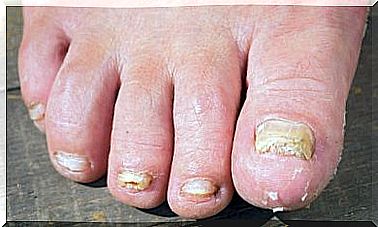Asthenia Of Circulatory Origin, What Is It?
Asthenia makes life difficult for the individual, making their daily tasks become more and more heavy.

The term asthenia comes from the Greek, where a means ‘without’, and sthenos means ‘strength’. It is characterized by a generalized and prolonged weakness, which, unlike common fatigue, does not appear after exertion and does not disappear with rest. For this reason, asthenia makes it difficult to carry out activities.
We can say then that asthenia is characterized by a persistent feeling of lack of energy and motivation, such as great exhaustion.
Importantly, it is not synonymous with drowsiness. Drowsiness and apathy can be the result of fatigue after an effort or lack of specific rest. When fatigue is not relieved by sleeping well, and with little stress, it should be medically evaluated, as it could be asthenia.
Asthenia, in addition to causing a feeling of general physical heaviness, can cause memory loss, or a decrease in concentration.
Types of asthenia

In 50% of asthenia cases, there is no true muscle weakness. That is, it is a symptom perceived by the individual. Therefore, half of the cases are of psychic origin. It is usually caused by underlying depression, anxiety, or chronic stress. However, the symptoms are very real and can make a person’s life very difficult.
Anyone with asthenia will have to try harder to stick to their routine. Work, studies, household chores, etc., get complicated. Ultimately, motivation drops considerably.
When asthenia is organic, it can be the symptom of many pathologies. Its causes can be, among others:
- Cardiovascular causes: we will focus on them.
- Infections – Any infection, such as hepatitis or tuberculosis, can cause it.
- Neurological causes: such as Parkinson’s disease or myopathies.
- Cancer: both malignant tumors and their treatment (chemotherapy and radiotherapy) can cause asthenia.
- Endocrine or metabolic problems: hypothyroidism, diabetes, malnutrition, etc.
- Hematological causes: Asthenia is common in people with anemia or leukemia.
In the same way, it can be caused by the ingestion of toxins. The consumption of alcohol, and even some medications, usually cause asthenia.
Cardiovascular asthenia
The asthenia it is common in patients with heart failure. In heart failure, the heart doesn’t pump enough blood. Therefore, the muscles do not get all the energy that would be desirable.
These people find it difficult to make efforts. It can even be a simple task, like walking. In these cases, a burning sensation is experienced. The affected part stops being able to contract. Additionally, asthenia can also be the result of high blood pressure. Also from a cerebrovascular disorder.
In the case of heart failure, it is important for the patient to be active. To do this, even if it is complicated, you must do physical exercise. Walking, swimming, and even cycling are recommended. If symptoms are accentuated during exercise, it can be stopped. However, once recovered, the person must continue with the activity.
In fact, there are currently cardiac rehabilitation units. They allow to help patients with heart failure to make progressively greater efforts. In this way, it seeks to maintain the physical shape and health of the patient.
Neurocirculatory asthenia
Neurocirculatory asthenia is a specific type of asthenia. It is a psychosomatic disorder in which cardiovascular symptoms predominate. It usually appears in women and people under stress. An imbalance of the autonomic nervous system occurs. For this reason, palpitations, tachycardia, dyspnea and vertigo may appear. Precordial pain can also occur.
When asthenia is neurocirculatory, the origin is psychogenic. Therefore, although the symptoms are predominantly cardiovascular, heart disease does not develop. When stress or anxiety goes away, symptoms decrease.
Diagnosis

To diagnose asthenia, the most important thing is to take a proper medical history. The doctor must know what the symptoms are and when exactly they occur .
First, the ideal is to do a blood and urine test. Imaging techniques such as MRI or ultrasound can also help. Similarly, electrocardiograms are widely used. All of these tests will help find the underlying cause, if it exists.
If you continually feel tired and weak, you should see a doctor. It could be a symptom of a pathology that you do not know. The doctor will help you to rule out the possible causes and will establish a treatment that helps you, if possible.









